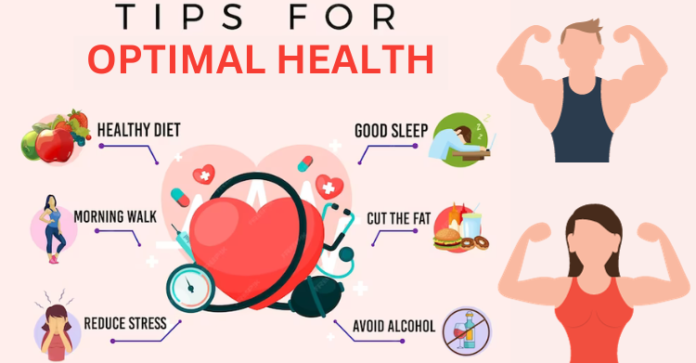Understanding the Importance of Maintaining Optimal Health
Maintaining optimal health is essential for a fulfilling and vibrant life. Our health impacts every aspect of our existence, from our physical well-being to our mental and emotional state. When we prioritize our health, we are better equipped to handle the challenges that life throws our way. Optimal health allows us to live life to the fullest, with energy, vitality, and a sense of well-being.
To truly understand the importance of maintaining optimal health, it is crucial to recognize the interconnectedness of our body and mind. Our physical health affects our mental and emotional well-being, and vice versa. When we neglect one aspect of our health, it has a ripple effect on the other areas. By prioritizing our health, we can achieve a harmonious balance between our body, mind, and spirit.
The Basics of a Healthy Lifestyle
Maintaining optimal health begins with adopting a healthy lifestyle. This involves making conscious choices that support our well-being on a daily basis. Here are some fundamental principles of a healthy lifestyle:
- Nutrition: A nutritious diet forms the foundation of good health. Consuming a variety of whole foods, such as fruits, vegetables, lean proteins, and whole grains, provides our bodies with the essential nutrients they need. Avoiding processed foods, sugary beverages, and excessive amounts of salt and saturated fats is key to maintaining optimal health.
- Physical Activity: Regular exercise is crucial for maintaining optimal health. Engaging in activities that raise our heart rate and strengthen our muscles not only helps us maintain a healthy weight but also improves our cardiovascular health, boosts our mood, and enhances our overall well-being. Aim for at least 150 minutes of moderate-intensity exercise or 75 minutes of vigorous-intensity exercise per week.
- Hydration: Staying hydrated is often overlooked but is vital for our health. Drinking an adequate amount of water helps regulate our body temperature, aids digestion, flushes out toxins, and keeps our skin glowing. Aim to drink at least eight glasses of water per day, and more if you engage in strenuous physical activity or live in a hot climate.
Essential Tips for a Healthy Diet
Maintaining a healthy diet is a cornerstone of optimal health. Here are some essential tips for incorporating healthy eating habits into your lifestyle:
- Eat a Variety of Nutrient-Dense Foods: Aim to include a wide range of fruits, vegetables, whole grains, lean proteins, and healthy fats in your diet. These foods are rich in essential vitamins, minerals, and antioxidants that support your overall health.
- Portion Control: Pay attention to your portion sizes to avoid overeating. Use smaller plates and bowls to help control your portions, and listen to your body’s hunger and fullness cues.
- Limit Processed Foods and Added Sugars: Processed foods are often high in unhealthy fats, added sugars, and sodium. Minimize your intake of these foods and opt for whole, unprocessed alternatives whenever possible.
- Cook at Home: Cooking your own meals gives you control over the ingredients and allows you to make healthier choices. Experiment with new recipes and try to include a variety of flavors and textures in your meals.
- Practice Mindful Eating: Slow down and savor each bite. Pay attention to the taste, texture, and aroma of your food. Eating mindfully can help you recognize when you are full and prevent overeating.
The Role of Exercise in Maintaining Optimal Health
Regular exercise is a powerful tool for maintaining optimal health. It not only helps us maintain a healthy weight but also offers numerous physical and mental health benefits. Here’s how exercise contributes to our overall well-being:
- Physical Health Benefits: Engaging in regular exercise improves cardiovascular health, strengthens muscles and bones, boosts immune function, and reduces the risk of chronic diseases such as heart disease, diabetes, and certain types of cancer.
- Mental and Emotional Health Benefits: Exercise has a profound impact on our mental well-being. It releases endorphins, also known as “feel-good” hormones, which improve mood and reduce symptoms of anxiety and depression. Regular exercise also enhances cognitive function, improves sleep quality, and reduces stress levels.
- Types of Exercise: Incorporate a combination of cardiovascular exercises, strength training, and flexibility exercises for a well-rounded fitness routine. Examples of cardiovascular exercises include brisk walking, running, cycling, swimming, and dancing. Strength training exercises can include weightlifting, resistance band workouts, and bodyweight exercises. Flexibility exercises, such as yoga or stretching, improve joint mobility and reduce the risk of injury.
Managing Stress and Mental Well-being
In our fast-paced world, stress has become a common part of our lives. However, chronic stress can have detrimental effects on our health. It is important to manage stress effectively to maintain optimal health. Here are some strategies to reduce stress and improve mental well-being:
- Practice Stress-Relieving Techniques: Engage in activities that help you relax and unwind, such as meditation, deep breathing exercises, yoga, or tai chi. These practices promote relaxation, reduce stress hormones, and improve overall well-being.
- Prioritize Self-Care: Make time for activities that bring you joy and nurture your well-being. This can include hobbies, spending time in nature, reading, taking baths, or engaging in creative outlets. Self-care is essential for recharging your batteries and maintaining a healthy work-life balance.
- Establish Healthy Boundaries: Learn to say no when necessary and set boundaries that protect your mental and emotional well-being. It is important to prioritize your needs and avoid overcommitting yourself, which can lead to increased stress levels.
Importance of Regular Check-ups and Preventive Care
Regular check-ups and preventive care are essential for maintaining optimal health. Even if you feel healthy, it is important to schedule routine visits with your healthcare provider to detect any potential health issues early on. Here’s why regular check-ups are important:
- Early Detection of Health Issues: Regular check-ups allow healthcare professionals to identify and treat health conditions in their early stages. This increases the chances of successful treatment and reduces the risk of complications.
- Monitoring Overall Health: Regular check-ups help monitor your overall health and well-being. Your healthcare provider can assess your vital signs, perform necessary screenings and tests, and provide personalized recommendations for maintaining optimal health.
- Preventive Care: Preventive care measures, such as vaccinations, screenings, and lifestyle counseling, can help prevent the onset of diseases and promote optimal health. Your healthcare provider can provide guidance on preventive measures based on your individual health history and risk factors.
The Impact of Sleep on Overall Health
Sleep is often overlooked but is crucial for maintaining optimal health. Quality sleep plays a vital role in various aspects of our health, including:
- Physical Health: During sleep, our bodies repair and rejuvenate. It is essential for proper immune function, hormone regulation, and the restoration of bodily systems. Sufficient sleep improves cardiovascular health, reduces inflammation, and supports healthy weight management.
- Mental and Emotional Health: Sleep is closely linked to mental and emotional well-being. It enhances cognitive function, improves concentration and productivity, and helps regulate mood. Chronic sleep deprivation is associated with an increased risk of anxiety, depression, and other mental health disorders.
- Tips for Better Sleep: Establish a consistent sleep schedule, create a relaxing bedtime routine, ensure your sleep environment is dark and quiet, limit exposure to electronic devices before bed, and avoid caffeine and stimulating activities close to bedtime. If you have persistent sleep issues, consult with a healthcare professional.
Incorporating Mindfulness and Self-Care Practices
Mindfulness and self-care practices are essential for maintaining optimal health in our fast-paced and often stressful lives. These practices help us cultivate self-awareness, reduce stress, and enhance overall well-being. Here are some ways to incorporate mindfulness and self-care into your daily routine:
- Mindful Meditation: Set aside time each day for mindful meditation. Sit in a quiet space, focus on your breath, and observe your thoughts and sensations without judgment. Regular meditation practice can improve mental clarity, reduce stress, and enhance self-awareness.
- Gratitude Practice: Cultivate a gratitude practice by reflecting on and expressing gratitude for the positive aspects of your life. This practice helps shift your mindset towards positivity and fosters a sense of contentment and appreciation.
- Engage in Activities That Bring Joy: Make time for activities that bring you joy and rejuvenate your spirit. This can include spending time with loved ones, pursuing hobbies, listening to music, or engaging in creative outlets. Prioritizing activities that bring you joy promotes overall well-being and helps reduce stress.
Building a Support System for Better Health
Building a support system is essential for maintaining optimal health. Surrounding yourself with a network of supportive individuals can provide encouragement, motivation, and accountability on your health journey. Here are some ways to build a strong support system:
-
- Connect with Like-Minded Individuals: Join groups or communities that share your health goals and interests. This can be a fitness class, a support group, or an online community. Connecting with like-minded individuals provides a sense of belonging and can foster long-lasting friendships.
- Seek Professional Support: Consult with healthcare professionals, such as doctors, nutritionists, or personal trainers, who can provide expert guidance and support tailored to your specific health needs. They can help you set realistic goals, monitor your progress, and provide the necessary knowledge and resources for maintaining optimal health.
- Lean on Loved Ones: Share your health journey with trusted friends and family members. Their support, understanding, and encouragement can make a significant impact on your motivation and well-being. Don’t hesitate to ask for help or seek emotional support when needed.
Resources for Maintaining Optimal Health
Maintaining optimal health requires continuous learning and access to reliable resources. Here are some resources to support your health journey:
- Books and Websites: Explore reputable books and websites that provide evidence-based information on nutrition, exercise, stress management, and other health-related topics. Some recommended resources include “The Blue Zones” by Dan Buettner, “How Not to Die” by Dr. Michael Greger, and the websites of reputable health organizations such as the World Health Organization (WHO) and the National Institutes of Health (NIH).
- Apps and Online Tools: Utilize health and wellness apps that help track your progress, provide personalized recommendations, and offer guidance on various aspects of health. Some popular apps include MyFitnessPal for nutrition tracking, Headspace for meditation, and Fitbit for activity tracking.
- Healthcare Providers: Establish a relationship with healthcare providers who can offer guidance, support, and resources specific to your health needs. Regular visits to your primary care physician, nutritionist, and other specialists can provide personalized recommendations and ensure you stay on track with your health goals.
Conclusion
Maintaining optimal health is a lifelong journey that requires commitment and dedication. By understanding the importance of optimal health and implementing the tips and tricks outlined in this guide, you can improve your overall well-being and lead a more fulfilling life. Remember, small changes made consistently over time can have a profound impact on your health. Prioritize your well-being, listen to your body, and make choices that support your optimal health. Here’s to a vibrant and healthy life!
-









